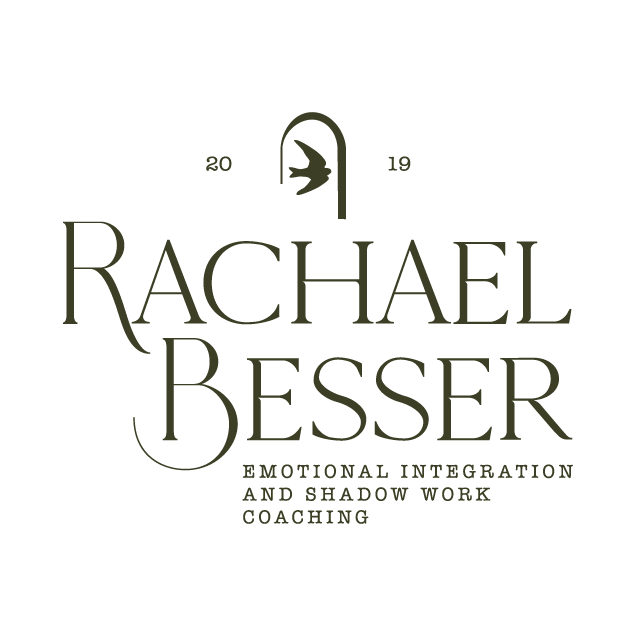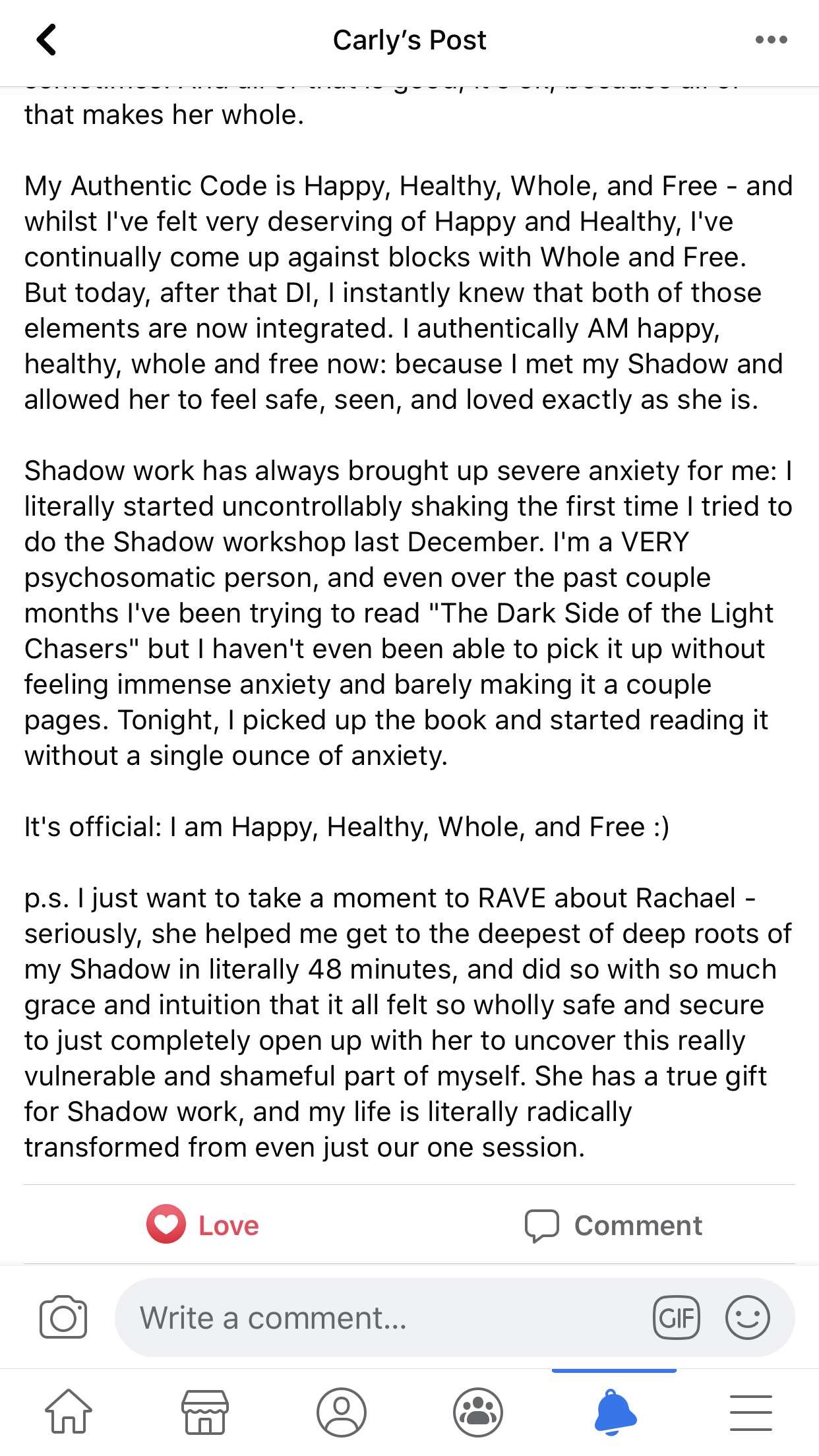Ease in the Self;
Ease in the world.
Body-based Shadow Work & EMOTIONAL INTEGRATION Coaching
Body-Based Shadow Work™️ is an advanced, integrative approach to personal transformation for the spiritual practitioner or self-growth enthusiast who has already done the foundational work. You’ve explored therapy, coaching, subconscious reprogramming, and spiritual practices, and now you’re ready to take radical ownership of your human experience. This practice bridges the gap between mind and body, using the wisdom of the physical body as a portal to access and integrate your shadow aspects—those unconscious parts of yourself that carry both limiting beliefs and hidden potential.
“Until you make the unconscious conscious, it will rule your life and you will call it fate.”
-Carl Jung
Does this Sound familiar?
You’ve done the work. You’ve spent years—maybe even decades—in therapy, invested thousands of dollars in coaching programs, training methodologies, and tried countless spiritual practices in your quest to find flow. And yet… you’re still not quite “there.” Maybe you’re not even sure where “there” is, though you likely have a few ideas of what it could mean. Despite your growth, there’s still a lingering sense of being stuck.
Make no mistake—you’ve experienced monumental shifts and seen tremendous personal growth.
But even with all of your inner breakthroughs, your external reality still doesn’t quite reflect the changes you’ve made within. You may still be encountering familiar relational dynamics—exes, situationships, or family issues—where you can see the patterns, but haven’t quite been able to shift them. Or perhaps you’re facing unforeseen circumstances that evoke deeper parts of you, in a way where your old tools no longer seem as effective, leaving you back in familiar patterns of overwhelm or shut down when you thought you had moved past these.
Maybe you’ve already developed a beautiful, relationship with your inner child — and yet — you still feel the familiar sting of shame from people-pleasing, perfectionism, comparisonitis, and not-enoughness. Logically, you understand what’s happening and why… but the shifts aren’t sticking. Consistency in your transformation remains elusive.
Underneath it all, there’s a persistent feeling that you’re capable of more. You know, deep down, that you can give more, embody more, and step into a greater level of freedom, ease, and personal power—not just for yourself, but to empower those around you—your clients, your community, and your loved ones. It feels like a deeper potential is waiting just beyond your reach, but accessing it seems unclear. You sense that a new level of embodiment is possible, but what you need is a clearer, more effective path to get there alongside someone who has done it before.
You are the one you’ve been waiting for.
Body-Based Shadow Work Coaching can help you access deeper layers of your inner world, allowing you to identify and transmute emotional and energetic blocks that still limit your full creative expression. You will master a new level of connection with your intuition and your higher power, using the outer world as a mirror to reflect your inner truth. By engaging with this body-centered modality, you’ll become more attuned to the signals of your nervous system, learn to work through discomfort with grace, and unlock the deeper wisdom stored within your body.
You’ll gain the tools to navigate life with a newfound sense of internal authority and empowerment, bringing magic and intentionality to your personal journey and to the communities around you.
Who is the program FOR?
You are a practitioner (coach, therapist, or healer) — or experienced personal growth enthusiast —who has already done significant inner work but is seeking a deeper level of transformation.
You have a basic understanding of common psychological models (e.g., Internal Family Systems, Polyvagal Theory, Attachment Theory, etc.) and are ready to apply these concepts in a deeper, embodied way.
You’ve done considerable work with your inner child and/or Parts but still feel challenged by ‘stuckness,’ emotional overwhelm, self-sabotage, or repeating relational patterns (e.g., exes, family dynamics, work problems, etc).
You are ready to access a new level of your personal and professional potential.
You’re comfortable with introspection and have a strong sense of self-awareness but recognize that there are still blind spots holding you back from embodying your full power.
You are open to working with a blend of practices to reconnect with your body’s wisdom and expand your emotional capacity.
You’re seeking a long-term transformation and are committed to doing the deep, vulnerable work required to align your internal growth with your external reality.
Who is the program NOT for?
You are actively in an addiction or currently experiencing ongoing trauma that requires crisis intervention or immediate therapy (this work is designed for individuals who are ready for integration, not crisis management).
You are looking for quick fixes or surface-level solutions that avoid deep emotional engagement and introspection.
You are brand new to inner work and have not yet established an understanding of your limiting beliefs patterns, or personal triggers (I’d still love to help — reach out to me for other program referrals!).
You prefer traditional, talk-based coaching and are repelled by the to somatic, body-based, or spiritually integrative approaches to personal transformation.
You struggle with emotional regulation skills and often find yourself carrying a sense of crisis, even when nothing is really “wrong.”
You are not ready or willing to invest time and effort into building a relationship with your body’s emotional signals.
You are focused solely on external success, achievement, or material goals without a desire to address the underlying emotional and energetic patterns driving your behavior.
Coaching Principals
The core frameworks used in Rachael’s body-based shadow work coaching are designed to address the complex, interconnected challenges her clients face.
These include…
→ Shadow Work
Illuminate, Integrate, Liberate.
Through deep introspection, we reveal the hidden aspects of your unconscious mind and the roles you’ve been playing out in your life. By shining light on these shadows, you’ll be able to break free from limiting beliefs, reclaim disowned parts of yourself, and unlock your untapped potential. Shadow work is the key to stepping into greater alignment with your highest self.
→ Emotional Integration
Feel to Heal.
Emotions are not just mental states—they are energies that live in the body. This practice helps you understand and process your feelings more deeply, transforming them into sources of insight and power. By integrating emotions with ease and compassion, you’ll learn how to identify the limiting beliefs fueling internal friction and strengthen your emotional regulation. As you deepen your capacity to feel, you’ll reconnect with your intuition and reignite your personal power.
→ Nervous System Regulation & Somatic Practices
Rooted in Resilience.
Your body holds immense wisdom. By honoring your nervous system and learning to expand your window of tolerance, you’ll be better equipped to navigate life’s challenges with resilience and calm. Through somatic practices that nourish both internal and external resources, we support your body’s natural ability to heal, regulate, and thrive. This will help you face moments of stress or overwhelm with a sense of groundedness and strength.
→ Parts Work
Meet the Many Parts of You.
Your psyche is a symphony of different parts—each playing a unique role in your internal landscape. Informed by Internal Family Systems (IFS), Parts Work helps you build a relationship with key figures like the Inner Child, Inner Teen, Inner Critic, and more. By understanding and integrating these parts, you gain clarity on how they influence your emotions, thoughts, and behaviors. This deepens self-compassion and empowers you to consciously choose which parts lead the way in your life.
→ Spirituality
Connect to Your Higher Wisdom.
Spirituality, however you define it, is the bridge to deeper wisdom and guidance. By tapping into your connection with a higher power—whether that’s the universe, nature, or your inner knowing—you’ll trust the unfolding of your life’s journey. Spirituality anchors you in a deeper sense of meaning and purpose, helping you relinquish the need for control and find empowerment through trust and surrender.
The Body-Based Shadow Work™️ Mission
Imagine experiencing a profound sense of liberation from old emotional patterns that have kept you stuck. Imagine finding yourself standing in a deeper alignment with your highest self, no longer held back by the fears, doubts, or unprocessed emotions that once dictated your actions. Think of what it will be like to embody a more complete version of yourself—fully resourced, self-assured, and capable of holding space for others without losing your own center. Imagine doing so consistently, navigating the natural cycles of life and transformation with grace and ease.
After about ~4 months of Body-based Shadow Work coaching, expect to walk away with…
A heightened connection to your body’s signals and wisdom
A new depth of connection to your inner aspects of Self (also called, “Parts”)
A new level of expertise in emotional regulation and nervous system balance
A clearer sense of your purpose and how to express it in the world
Tools to maintain a harmonious balance between inward and outer experiences
A new connection to your innate sense of magic.
After the program
My desire for you, as your Shadow Work Coach, is that on the other side of our container is a fully empowered version of yourself—someone who leads with both intuition and grounded authority. The kind of person who doesn’t shy away from discomfort, who sees life’s challenges as opportunities for deeper healing and growth. Through your own transformation, you’ll give permission to those around you to step into their authenticity, creating ripples of empowerment within your community.
You are the conscious creator of your reality, aligned with your highest vision for yourself. Imagine moving through the world with an unshakable sense of inner peace, freedom, and ease, knowing that everything within you is not only welcome, but deeply respected, and so, so loved.
-
Shadow work (aka, one facet of Carl Jung’s psychological model), involves deep introspection of Self under the premise that everything we recognize in other people, especially the characteristics that create emotional charge in us, are already present in ourselves. By surfacing and integrating these repressed aspects of self, we are able to move into a deeper sense of wholeness. As a result, our capacity for resilience flourishes.
In the shadow work process, we explore the parts of ourselves that we may have disowned or pushed away, with the goal of integrating them into our conscious awareness. We do this through building a relationship to the Shadow Aspect, and all its beliefs, perceptions, thoughts, and feelings; needs and fears.
By doing this, we can learn to recognize that all Parts of our Self have a function, even those that may be uncomfortable, difficult to face, or seem to do nothing but ruin our lives.
By finding the function of these parts, we can upgrade our strategies and transform our relationship to these semiconscious aspects of Self. As a result, we effortlessly transform the way we show up in the world. There are no "good" or "bad" parts of ourselves — only parts that need to be acknowledged, accepted, and integrated (or re-employed with a new purpose!).
-
Emotional Integration involves bringing to awareness the emotions—and the energy or intentions they encapsulate—that we have previously rejected, dismissed, or suppressed.
In Rachael’s coaching practice, this process centers on recognizing our emotions as an intuitive guidance system. This system provides insights into our perceptions and internalized beliefs.
Integral to emotional integration is the cultivation of a daily practice to improve our emotional regulation and processing skills. By delving deeply into our emotional terrain, we expand our capacity for feeling and can learn to harness our emotions as conduits to our unconscious mind.
In addition, this process can unearth Shadow aspects that thwart us from manifesting our desires. Viewing both primary and secondary emotions as shadow aspects sheds light on our rejection of these innate physiological responses. Through the integration process, we can dispel limiting beliefs, gain clarity, and light the way towards the abundance we rightfully deserve. -
Shadow work from a trauma informed perspective means that the process and accompanying frameworks are guided by an understanding of how trauma impacts us on an individual and societal level, therefore dictating which aspects of Self are relegated to the Shadow.
This approach also recognizes that no aspect of self is inherently bad or shameful, but are often developed as coping mechanisms to protect us from harm.
By acknowledging the role of trauma in shaping our experiences and behaviors, we can work with the Shadow in a more compassionate and supportive way. It also means that the work is approached with an emphasis on safety, compassion, and a focus on empowerment in the present moment, rather than trying to dig into the past to understand “why,” or “what’s wrong with me?” (spoiler: nothing is wrong with you!)
-
The nervous system is the complex network of nerves and cells in our bodies that carry signals to and from the brain and spinal cord. It plays a vital role in our ability to perceive, process, and respond to internal and external stimuli. Essentially, the nervous system is responsible for regulating all of the body's functions, from breathing and heartbeat to movement and sensation.
Intriguingly, the activations we feel within our nervous system serve as tangible evidence of the more abstract psychological concept known as the 'Shadow.' These physiological responses are often the physical manifestations of suppressed emotions, desires, or traumas — elements of our Shadow. As they emerge, they create ripple effects within our nervous system. As a Somatics-Informed Shadow Work coach, I recognize the profound connection between somatic sensations and the hidden recesses of our psyche. By weaving these two threads together, I work with clients to unearth, understand, and integrate these shadow parts, enabling them to achieve a harmonious balance between body and mind and empowering them to take control of their own nervous system regulation. -
Nervous system regulation is a foundational principle in the coaching model Rachael uses. It involves nourishing our internal and external resources, and consciously expanding our capacity to handle stress, in order to create a more balanced and resilient system.
At the core of nervous system regulation is the concept of Somatics, which is the practice of cultivating awareness of bodily sensations and using that awareness to regulate the nervous system. By developing somatic awareness and regulation skills, we can better manage stress and trauma, improve emotional and physical health, and deepen our overall sense of well-being. As a Somatics-Informed Shadow Work coach, I work with clients to develop these skills and empower them to take control of their own nervous system regulation.One of the key skills in this model is self-attunement, which is the process of tuning into the emotions and sensations in our body, and translating them into their most raw forms of fear and desire. By treating all emotions as direct lines of communication to our subconscious mind, we can release limiting narratives or anxious thought loops, and alchemize the energy of each emotion. This strengthens our relationship with ourselves and helps us better understand how we perceive the world around us. As we become aware of the meaning behind each emotion, we can identify our physical and emotional needs, sharpen our intuition, and achieve true fulfillment.
-
Parts Work is a technique for working with the content of the subconscious and unconscious minds that is informed by Internal Family Systems (IFS) by Dr. Richard Schwartz.
In Rachael’s style of Parts Work, we access and review the content of the unconscious through meditative exercises, then interact with the emotion (the Part) and their accompanying beliefs, perceptions, desires, fears, and behavioral associations to facilitate a transformation.
Through Parts Work, we gain a better understanding of the different roles that exist within our psyche and how they communicate with / relate to one another. By harmonizing the system that makes up our inner Parts, we increase our sense of calm and security, and find clarity. Often clients discover that they had access to all the answers they could ever need this whole time — they just had to ask the right Part!
*Note: It is important to note that Rachael's approach is not therapy and is not a substitute for seeking professional mental health treatment when needed.
-
Q: Some people say Shadow Work should only be done with a therapist. What’s the difference between doing it with you?
A: It's important to note that while the work I do is deeply transformative, it is not therapy. As a coach, I am not licensed to diagnose or treat any mental health conditions. Instead, I offer guidance and support to help you navigate your inner world and access your own innate wisdom and healing.
While traditional therapy often focuses on exploring past trauma and limiting beliefs, my approach to shadow work is more present-focused, and is geared towards helping you identify and release patterns that are keeping you stuck in the present. We work together to explore your unconscious beliefs and behaviors, and uncover the root causes of any challenges you may be facing.
It's also important to note that coaching is a collaborative process, and you are ultimately responsible for your own growth and transformation. As your coach, I am here to support you and offer guidance, but the work we do together is a partnership. It's up to you to show up and do the work, and to take ownership of your own healing journey.
If you are seeking therapy or have been diagnosed with a mental health condition, it's important to seek support from a licensed mental health professional. However, if you are looking to explore your inner world, release patterns that are holding you back, and step into your power, shadow work coaching may be the right fit for you.
-
The purpose of incorporating spirituality into a shadow work practice is to tap into a source of inner guidance that can help us navigate life's challenges with greater ease and trust, allowing us to let go of our control patterns. By developing a deeper relationship with our higher power (whatever that means for you), we can access a wellspring of resilience and wisdom that supports us in the process of unblocking and healing. Rachael's coaching approach emphasizes the importance of working with clients' personal belief and value systems as she guides them in cultivating a sense of reverent spiritual connection that feels deep, grounded, and authentic.
-
Rachael is a practicing astrologer and, upon request, can incorporate the use of astrology in her coaching container as a tool for clients to reflect on patterns that may be at play in their lives. She offers birth chart and transit chart readings using Hellenistic astrology (Placidus or Whole Sign housing systems) to help clients investigate the corners of their psyche or arenas of life that they may otherwise miss. Chart readings can also offer clues and insights on which shadow aspect to examine, as well as in what arena of life. Through this process, clients can gain a deeper understanding of themselves and how they relate to the world around them, ultimately aiding them in their personal growth and journey towards self-discovery and evolution.
“When you change the way you look at things, the things you look at change.”
Hi, I'm Rachael!
I'm a multi-certified Somatic Coach and Shadow Work practitioner specializing in helping women leaders reconnect with their intuition through embodiment, spirituality, and depth work.
Before any formal training, I first found this work as someone desperate for a way out of chaos. I come from an ancestral line marked by trauma, addiction, and codependency patterns, all underscored by an authoritarian value system. As many of us in this work tend to be, I was born an extremely sensitive child. I quickly learned that to survive, I needed to find a way to "turn off" my emotions. This became dissociation, chronic numbing behaviors, and ultimately cycles of self-abuse and neglect that cut me off from myself, from others, and from the very thing I would later discover was the portal into real magic: my emotions.
Through shadow work, somatic practices, and lessons from an unlikely "past life" as a horse trainer, I discovered tools that didn't just help me heal. These frameworks and the toolkit I built offered me ways to transform my life from one of constant anxiety and cycles of over-functioning and paralysis into one where I show up confidently and capably, rhythmically returning to a sense of freedom and ease.
Today, I work with intuitive leaders who feel trapped or stuck—whether in their life, business, career, or relationships. Through shadow work and somatic practices, we build the skills that create real change: speaking up for yourself, setting boundaries, making aligned decisions, and systematically building a life that reflects your values and fulfills your desires. My clients move from feeling anxious and stuck to confident, capable, easeful, and free.
Rachael is a Certified Life Coach and seasoned Shadow Work Practitioner. She holds certifications in Integrative Somatic Trauma Therapy, is a Level 3 Integrative Somatic Parts Work Practitioner, and has completed trainings in DBT (Dialectic Behavioral Therapy), IFS informed Parts Work, as well as a number of rich continuing education trainings and programs from industry titans such as Dr. Peter Levine, Dr. Richard Schwartz, Dr. Scott Lyons, Dr. Arielle Schwartz, Staci K. Haines, Nkem Ndefo, MSN; Deb Dana, LCSW, Lisa Dion, LPC; Manuela Mischke-Reeds, LMFT; Dr. Gabor Mate, Dr. Pat Ogden, Dr. Albert Wong, Dr. Bessel Van Der Kolk, Dr. Diane Poole Heller, and many others as she continues to grow her own knowledge.
Rachael blends this rich body of knowledge with her own lived experience, creating a powerful coaching container for clients ready to explore their shadows and embody their highest potential. She’s collected and integrated a wide range of tools, techniques, and somatic practices—going far beyond traditional methods like meditation and journaling—to ensure that your shadow integration process is both effective and deeply supportive. Rachael's personal journey adds a unique depth to her work, allowing her to connect with clients on a profound level. Through her lived understanding and compassion, she creates a space where you will feel truly seen, heard, and empowered as you move through your own transformation.
“Rachael’s demeanor immediately helped me feel comfortable and her clear framework was easy to understand and apply. Her ability to gently guide me into my body’s wisdom helped me identify my needs and name changes I wanted to make. I’d recommend working with Rachael if you’re ready to tap into your body’s wisdom to help you move toward more purpose and power.”
“This session could not have come at a better time!! The practices were embodied, interactive and incredibly helpful!!!!!!!!!!!!!!!!!!!!!!!!!!!!!!! It is so healing to practice in community! Rachael set a very safe, brave, open, caring and authentic container. Thank you Rachael!!!!”
“Rachael’s expertise in navigating challenging emotions, combined with her exceptional facilitation skills, creates a deeply powerful experience for everyone.”
“I appreciate Rachael’s skill in guiding us to in touch with our body sensations while also noticing the stories in our head. ”
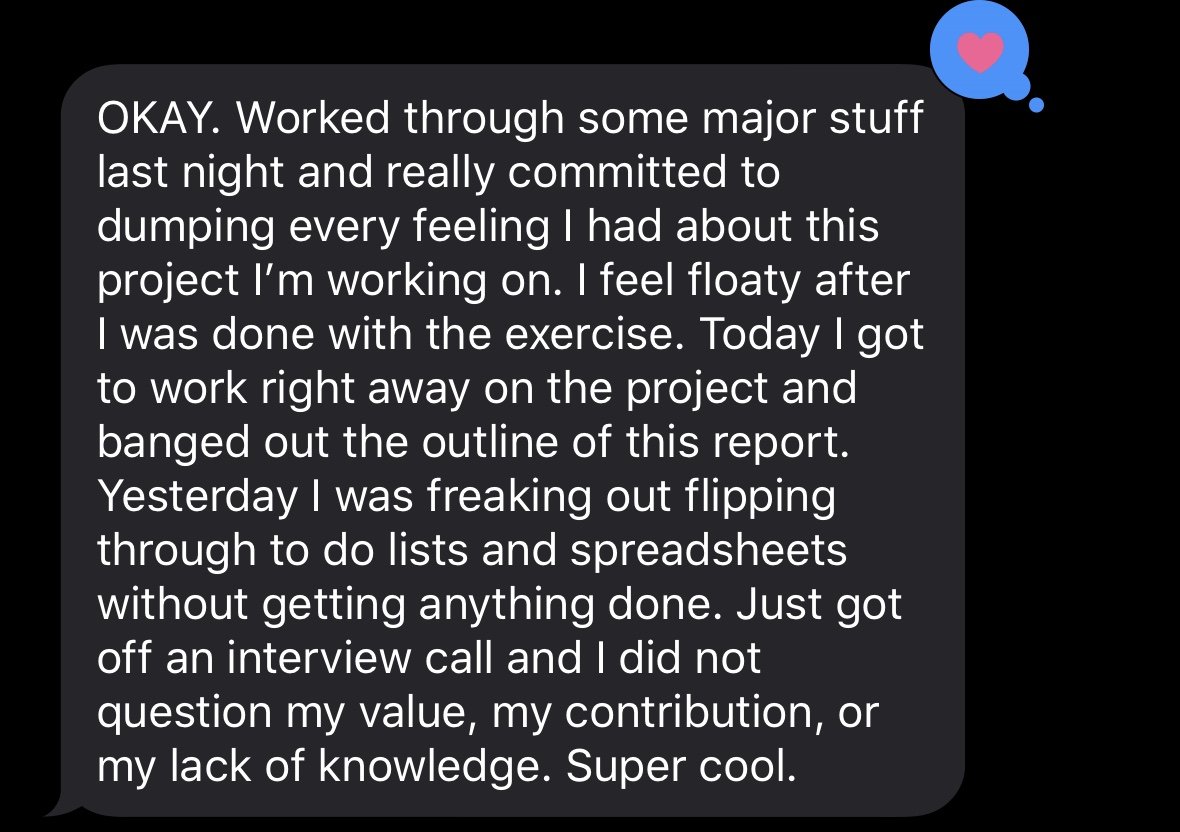
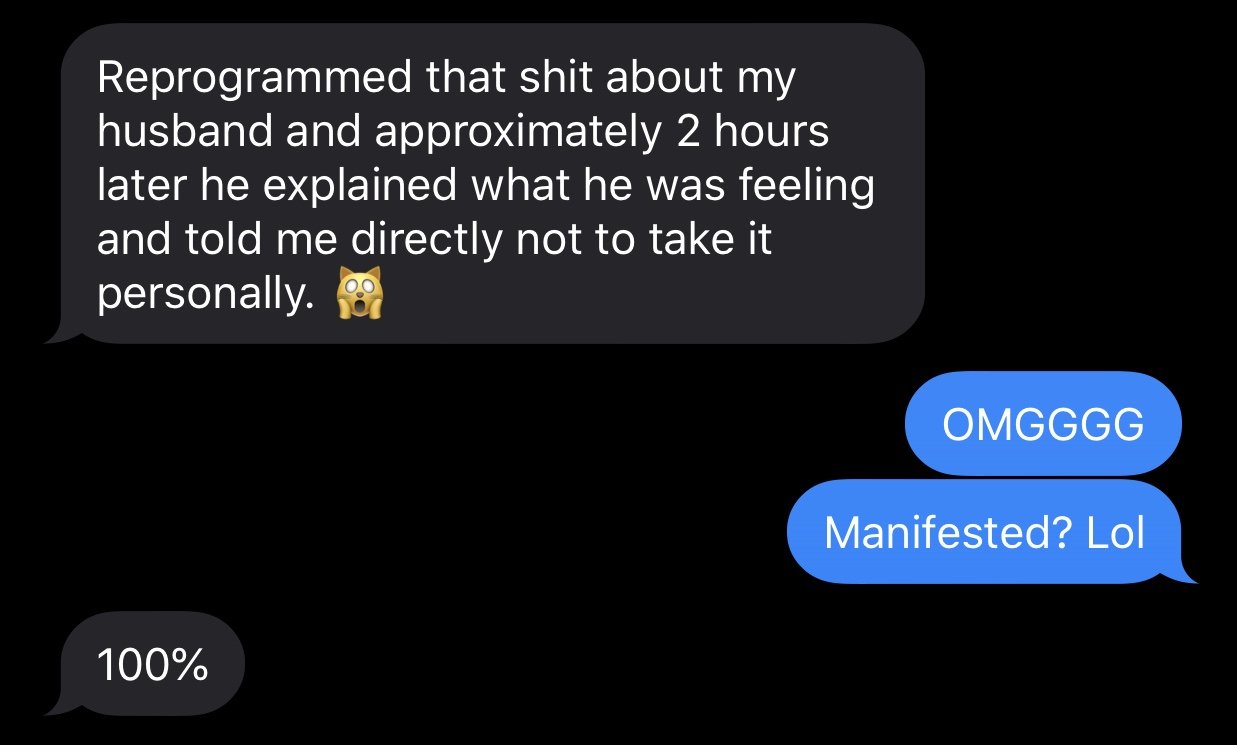
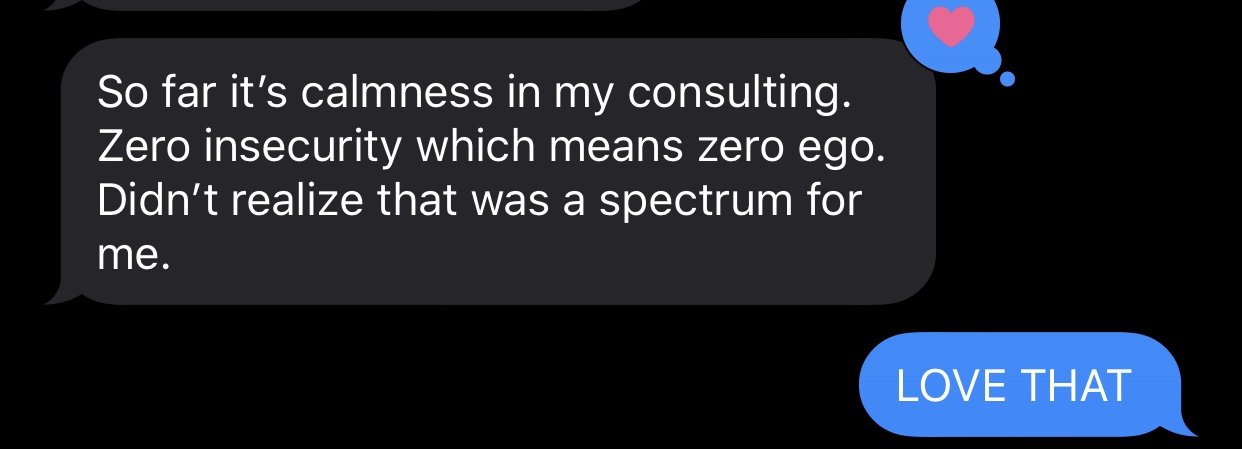
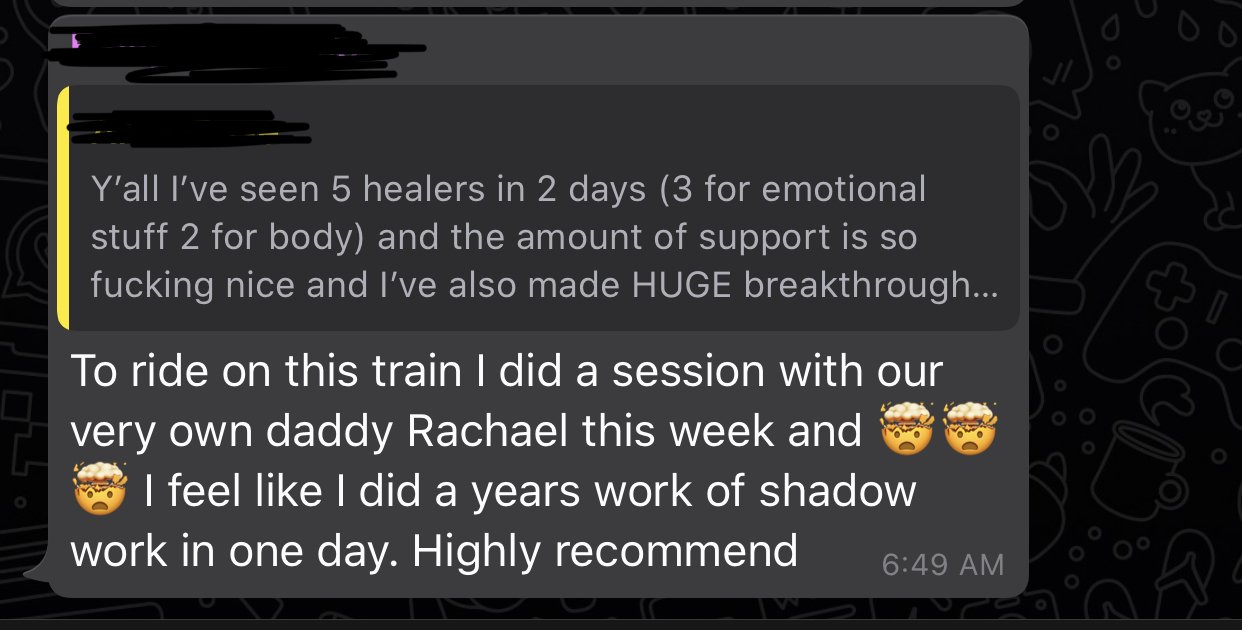

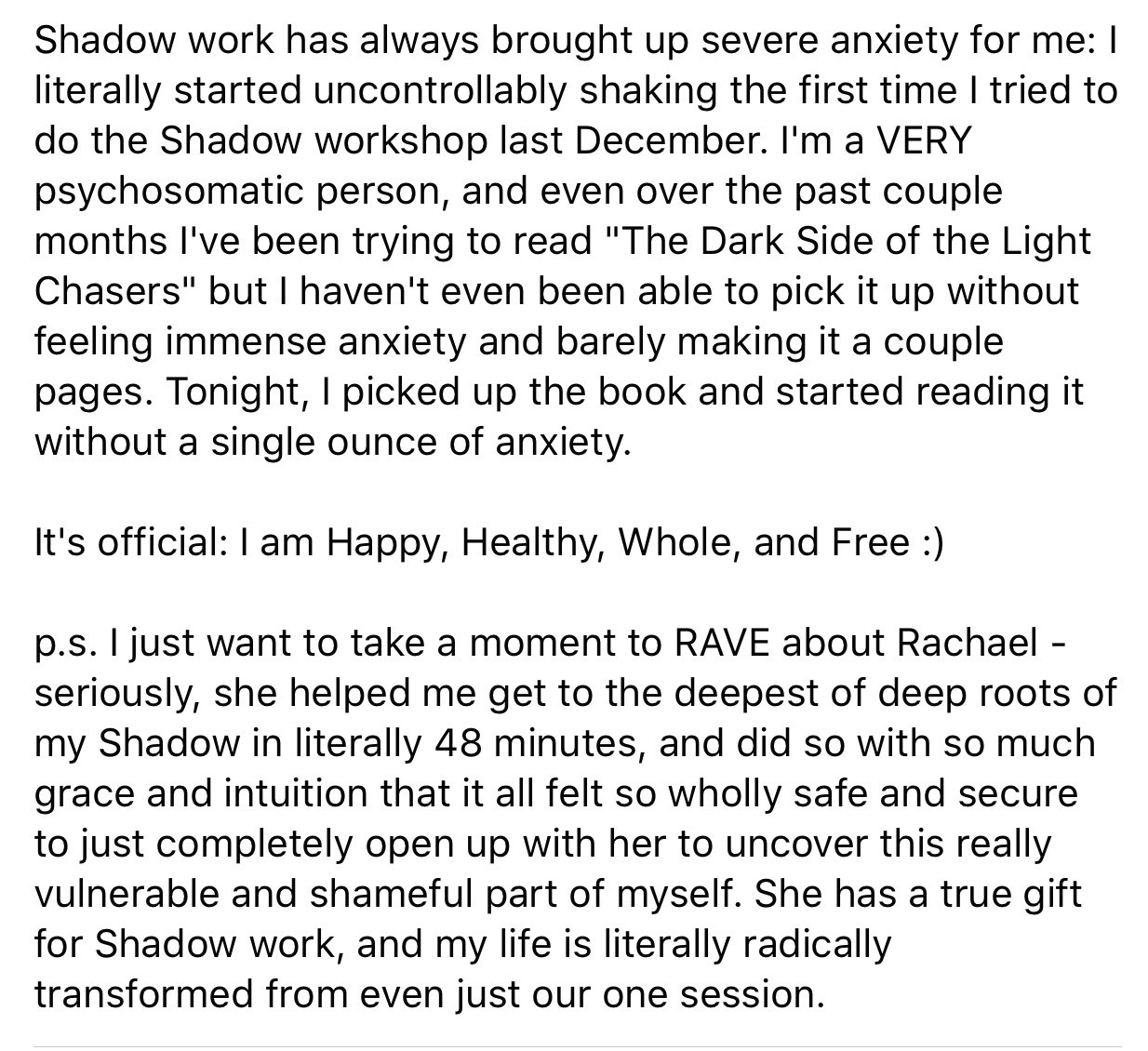
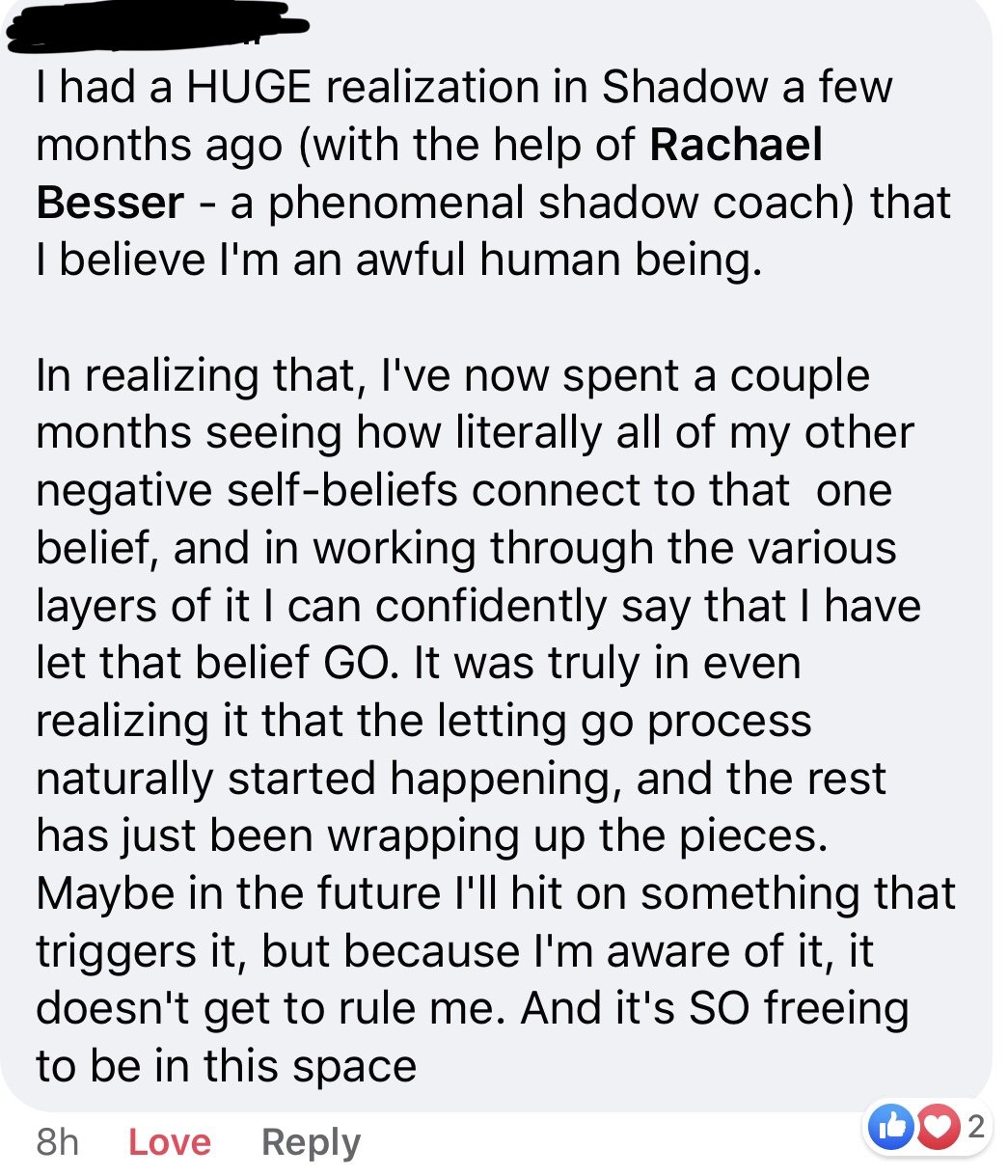
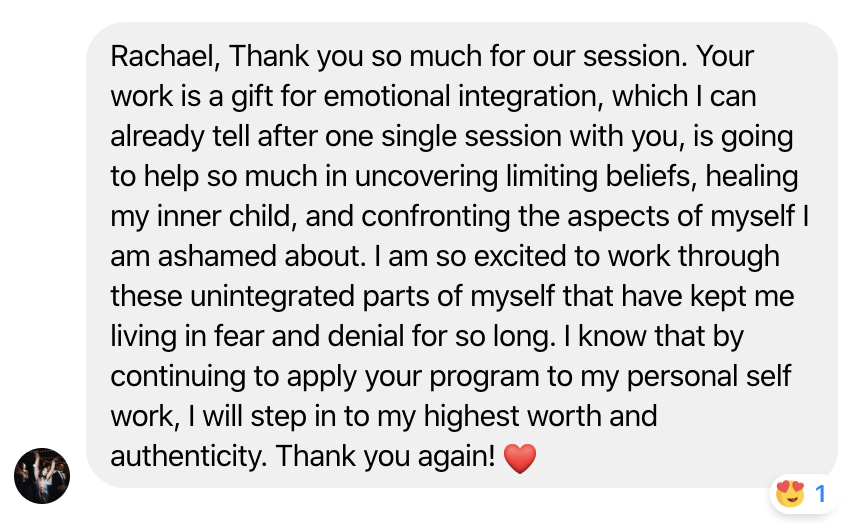
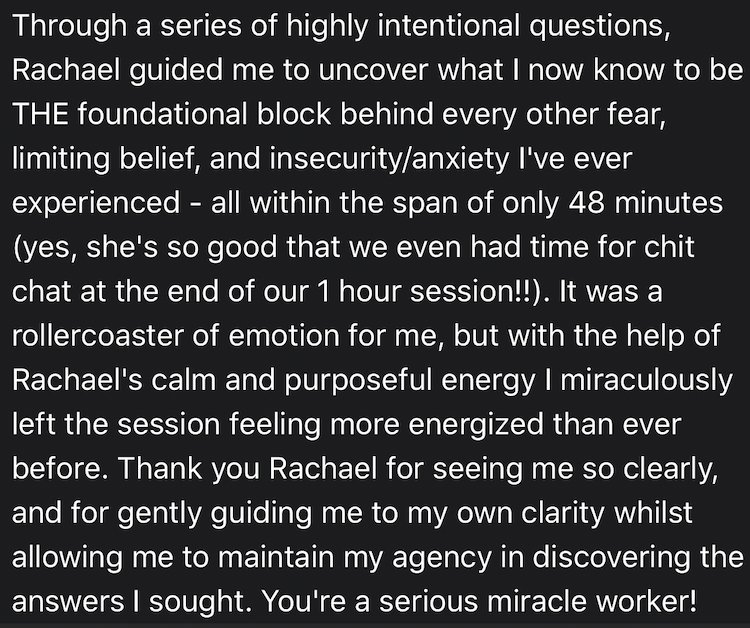









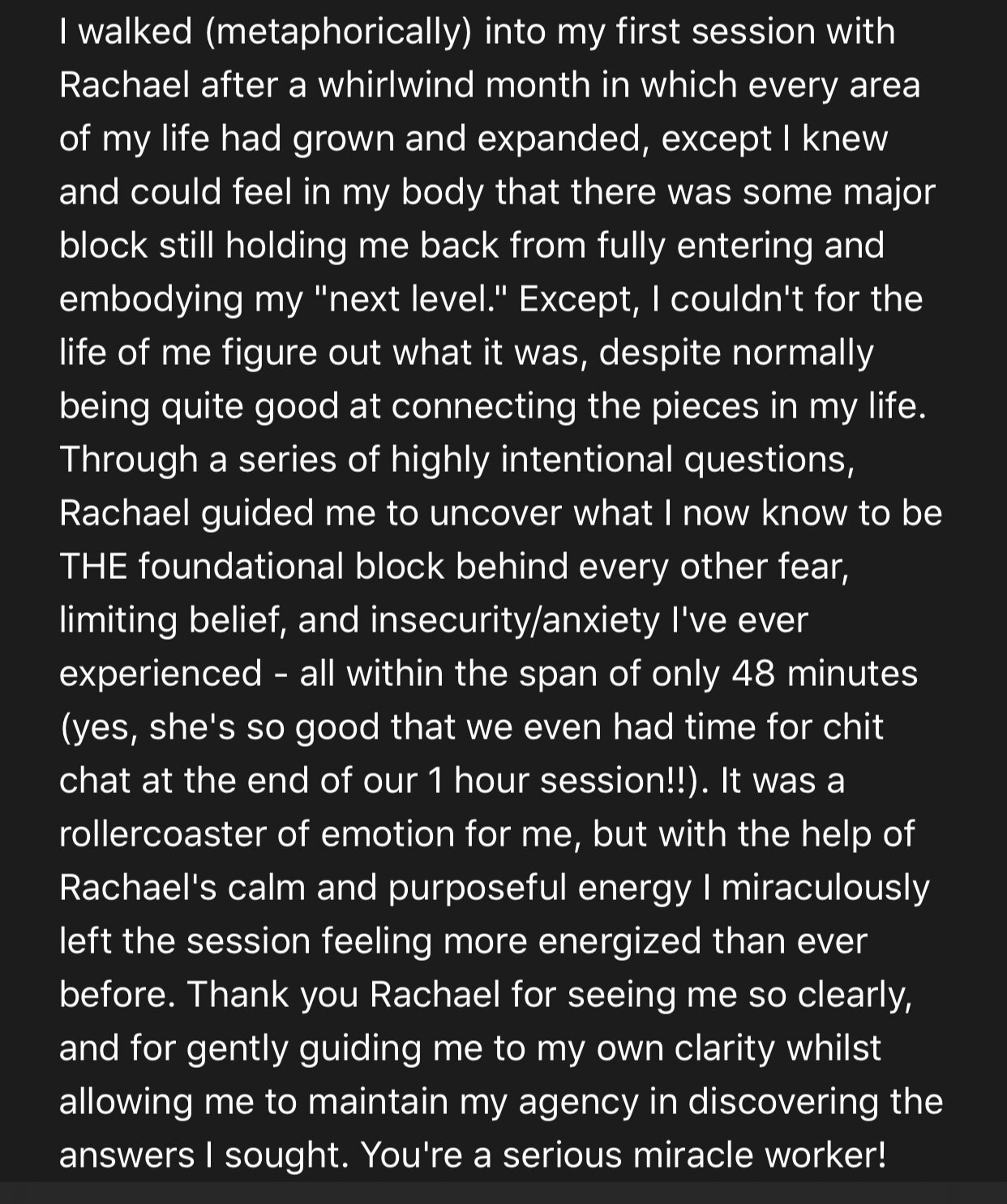






“I am blown away. After just a few sessions, I’m already recognizing patterns that feed into my self sabotaging behavior throughout my daily life. I’ve done program after program with okay results, but having Rachael act as my guide through the work is seriously a game changer. Because of the questions she asks and homework she provides, I am able to ACTIVELY take steps and choose new patterns. I’m already noticing massive shifts in my life (especially my dating life!!). This work goes so much deeper than I ever anticipated, and I’m immensely grateful for finding Rachael when I did — I would not have gotten this far without her!!!”
-
Shadow work is the process of exploring and integrating the unconscious or repressed aspects of ourselves. This concept was first introduced by psychologist Carl Jung, who believed that the shadow is a crucial part of our psyche that is often ignored or rejected, but holds all of our untapped potential. By working with our shadow, we can gain a deeper understanding of ourselves and transform negative patterns and behaviors, and achieve our creative potential to build a life of abundance.
Modern teachers, such as author and teacher Carolyn Elliot (author of Existential Kink), have expanded on Jung's concept of shadow work and developed practical techniques for engaging with our shadow. These techniques include asking questions like, “What part of me LIKES feeling rejected, abandoned, criticized, and shamed?”
Understanding the function of our Shadow and then updating its job description (for example, going from self sabatoge as a form of self protection, to setting boundaries for self protection) Shadow work can become a powerful tool for personal growth. -
If you're interested in starting shadow work, it's important to approach it with intention and care to create a safe and supported space. One way to start is by working with a trained professional, such as a therapist or shadow work coach, who can guide you through the process and help you navigate any difficult emotions or experiences that may arise.
One powerful way to start doing shadow work safely is to ask yourself the questions "who am I now?" followed by "who do I want to be?" This comparison can help you identify the gap between where you are now and where you want to be, which we commonly refer to as the ‘Margin of Change.’
The Margin of Change represents the work that needs to be done in order to align your internal self with your desired external reality. By identifying this gap, you can start to explore the parts of you that might feel insecure about why you aren’t there yet — these insecurities are often shadow aspects (aka, untapped potential, stuck emotions, limiting beliefs, or unconscious Parts of Self) that may be holding you back from taking action or doing what you know you “should” or “could” be doing.
This process can be challenging, but it is ultimately rewarding and can lead to immensely powerful personal growth and emotional liberation. Remember to approach this process with self-compassion and seek support from a qualified professional, as needed. -
In today's rapidly changing and unpredictable world, it's more important than ever to connect with our inner guidance system. Doing shadow work allows us to become radically honest about our worldviews by also becoming more conscious of our emotions, beliefs, and projections. This enables us to make decisions that align with our core values.
Shadow work helps us to identify and break free from false and disempowering narratives, allowing us to create a more authentic, fulfilling, and abundant lives. By doing shadow work, we can become more resilient, empowered, and capable of navigating unprecedented times with clarity and purpose. -
Shadow work can be an intense and emotional process, and some people may wonder if it is dangerous. While shadow work can bring up difficult emotions and memories, it is not inherently dangerous if done in a safe and supportive environment. It is important to understand your own "window of tolerance" and work within those limits, as pushing yourself too far can lead to emotional overwhelm or retraumatization. Co-regulation with a safe person or trusted professional can help you stay within your window of tolerance and provide support when big feelings come up. It is essential to approach shadow work with care and intention, and work with a trained professional or support system to ensure a safe and transformative experience.
-
If you're wondering whether you're ready to start shadow work, here are a few signs that may indicate it's time to dive in.
1) You feel a sense of dissatisfaction or disconnection with your life, despite appearing successful on the surface. This can be from operating out of alignment with your authentic desires and true values, following instead what you “should” do (which can be largely based around what you’ve been conditioned to believe is “right” or “good”).
2) You may have repeating patterns or cycles of behavior that you can't seem to break free from. This can be caused by unconscious aspects of self (Shadow Aspects) influencing your perception and behavior by keeping you unconscious to the ways you may be participating in these patterns. This is not to victim blame, rather to become radically honest with the circumstance and bring attention back to what we can control, then upgrading our personal boundaries.
3) You may find yourself feeling triggered or reactive in certain situations or relationships, and can't understand why. This can often be as a result of putting unconscious expectations on others, witholding our personal needs, or shaming the parts of ourselves that have acted the way the other person is acting towards us now.
These are all signs that there may be unresolved issues or unexamined parts of yourself that could benefit from some shadow work. It's important to remember that everyone has a unique window of tolerance for processing difficult emotions, and it's crucial to have a safe and trusted person to co-regulate with when big feelings arise. Working with a qualified professional can also provide additional support and guidance along the way.
